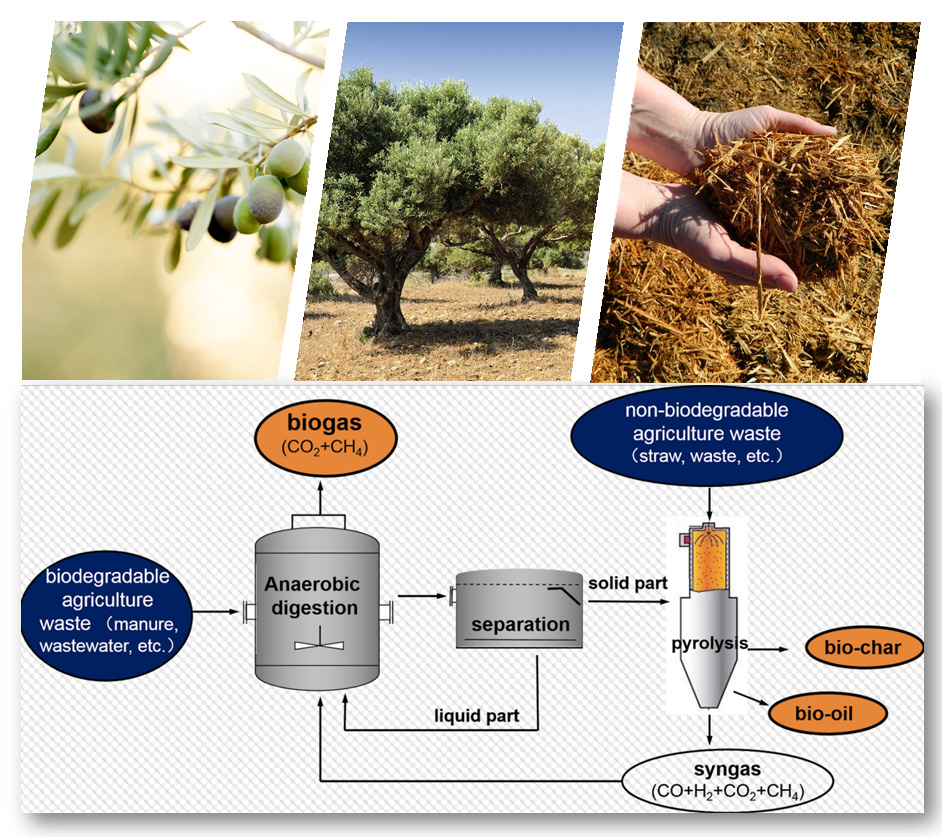SYNAGRON in Brief

Project SYNAGRON
Integrated management and exploitation of multi-dispersed agricultural residues – application to energy production
Agricultural waste biomass is the largest and most sustainable energy source, but its exploitation has not been realized until now. For example, it is estimated that Greece produces about 3 million tons of olive trees prunings annually which are burnt releasing about 2.7 millions of CO2 greenhouse gas emissions in the atmosphere. Alternatively, these prunings could annually produce 6.6 ΤWh of thermal energy or equivalently 2.3 TWh of electrical energy covering almost 4.8% of the total country's energy needs. These figures show that the uncontrolled final processing of any of the produced agricultural residues may leave a serious environmental footprint and deprive the opportunity for a sizable contribution in the national energy supply. Therefore, technological innovations for the full utilization of renewable bioenergy sources and practical application of recycle-bioenergy technologies are extremely urgent.
Read moreIdentity
Partners from Greece:
- University of Patras (UP), Department of Environmental Engineering (Coordinator)
- University of Western Macedonia (UOWM), Chemical Engineering Department
- SIRMET S.A.
Partners from China:
- Beijing University of Chemical Technology (BUCT)
- Beijing United Pioneer Environmental Engineering Co., Ltd (BUPEE)
- Nanjing Benran Environmental Technology Co., Ltd (BENRAN)
Other Collaborating Organizations:
- Khalifa University of Science and Technology (KUST), United Arab Emirates
Scientific Responsible
Prof. Vagelis G. Papadakis
Start
14/10/2019
Duration
3 Years
Project main objectives:
T he main objective of the project SYNAGRON is to pave the way for the environmentally friendly useful exploitation of the residues of the Chinese and Greek agricultural sectors for the generation of high value bio-products and/or energy. This is to be accomplished by designing and developing an innovative pyrolysis (Py) - anaerobic digestion (AD) processing plant for the conversion of agricultural wastes initially into useful bio-products, such as bio-char, bio-oil, syngas and biogas, and then into hydrogen and/or electrical energy.
AD and Py are two basic biowaste-degrading technologies and have been studied for decades. In recent years, the integration of these two basic technologies into a single system has been brought up as a new conception. Compared to the individual processes, this integration has the potential to offer great advantages in recovering bioenergy from agrowaste-biomass, reducing digestate management cost, recycling and reutilizing digestate and lowering greenhouse-gas releases. Additionally, enhanced performance of products obtained from the integrated processes has been observed, especially the strongly strengthened biochar’s ability to fix heavy metals and nutrient elements.
The SYNAGRON project proposes a new concept; not only the integration of AD with Py, but also their combination with the steam reforming reaction (SR) for the production of hydrogen rich mixtures (from biogas and bio-oil), which can pave the way for the commercial exploitation of biomass residues in a highly efficient and effective way.
Research focuses on the experimental and/or theoretical design and optimization of each process, on the design and optimization of the overall processing plant, on the development of innovative catalytic systems for the Py and the biogas and bio-oil reforming for H2 production reactions, and on the utilization of the gaseous products of the processing plant for highly efficient generation of electricity in Solid Oxide Fuel Cells (SOFCs). Through these technological advances the project aims at the optimal exploitation of every available biodegradable and non-biodegradable agricultural residue depending on the needs of the end users (farmers, enterprises, etc.) for specific bio-products and/or energy. It is the first time that such a holistic research project and energy policy for the exploitation of the agricultural residues is proposed.
The successful implementation of this project demands the highest possible degree of cooperation between the two Consortia. The two Consortia will benefit from the already established, harmonious collaboration that the academic partners enjoy. UP and UOWM have already signed (since June 2018) Memorandums of Understanding with BUCT with provisions for student exchange, staff exchange and research collaboration.


